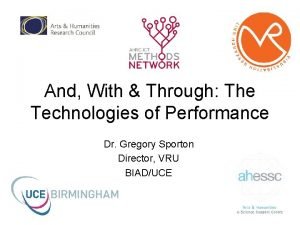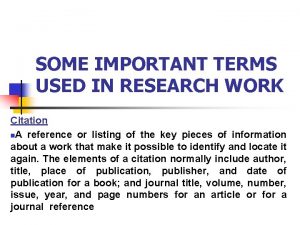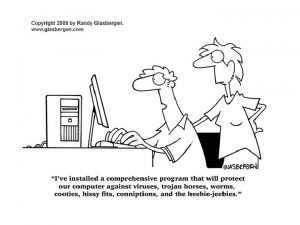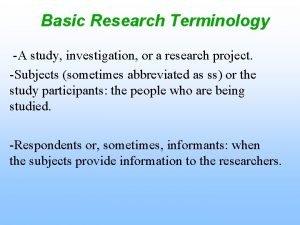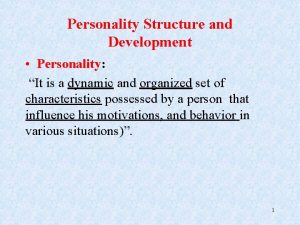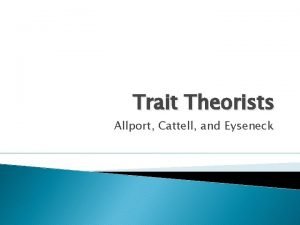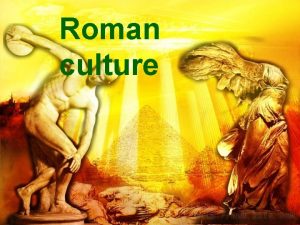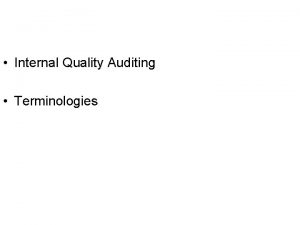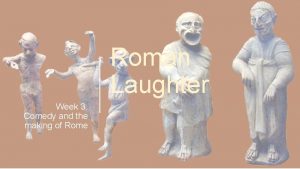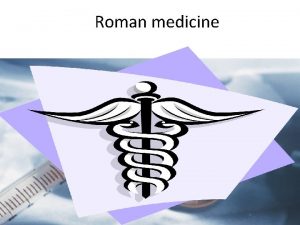Roman Laughter Week 1 Theories taxonomies terminologies joking




















- Slides: 20

Roman Laughter Week 1 Theories, taxonomies, terminologies: joking ancient and modern

‘…we shall not aim at imprisoning the comic spirit within a definition. We regard it, above all, as a living thing. However trivial it may be, we shall treat it with the respect due to life. We shall confine ourselves to watching it grow and expand. ’ Henri Bergson, Laughter: An essay on the meaning of the comic (1911, first published as Le rire, 1900)

Plato, Republic 388 e-389 a “Again, they must not be prone to laughter. For ordinarily when one abandons himself to violent laughter his condition provokes a violent reaction. ” “I think so, ” he said. “Then if anyone represents men of worth as overpowered by laughter we must accept it, much less if gods. ” “Much indeed, ” he replied. “Then we must not accept from Homer such sayings as these either about the gods: ‘Quenchless then was the laughter that rose from the blessed immortals When they beheld Hephaestus officiously puffing and panting’ (Homer, Iliad 2. 599 -600): we must not accept it on your view. ”

Aristotle, Nicomachean Ethics 4, 8 “Those who carry humour to excess are thought to be vulgar buffoons, striving after humour at all costs, and aiming rather at raising a laugh than at saying what is becoming and at avoiding pain to the object of their fun; while those who can neither make a joke themselves nor put up with those who do are thought to be boorish and unpolished. But those who joke in a tasteful way are called ready-witted, which implies a sort of readiness to turn this way and that. ”

Just joking: the social, the political, the moral • Is the Jewish Rabbi who recounts a joke that relies on antisemitic stereotypes really secretly self-hating? • Can a woman recounting a conventional rape joke invented by men be a feminist?

• Who is speaking/telling? • How is the joke performed? • In what context? • To what kind of audience? • With what kind of expectations? • Who laughs and who gets laughed at? • Do we laugh with, or at?


‘ Humor is the rehearsal and reestablishment of concepts’ Jonathan Miller (in Laughing Matters, ed. J. Miller and J. Durant, 1981)

Looking from sideways on: the punchline • Lateral thinking, e. g. puns and metaphors – we are made to think about how one word relates, or does not relate, to another. • The punch – shock? Weirdness? Political incorrectness or inappropriateness? Obscenity? Rule-breaking? Surprise? Offensiveness? Embarrassment? Humiliation? • Pleasure in unravelling normal ways of thinking? • The trick of incongruity – audience bamboozled into accepting, or almost accepting, an absurdity?

So. . • Jokes are acts of (re)interpretation: discuss • So are our responses to jokes: discuss

Fluid humor • The intellectual / cognitive • The emotional • The psycho-physical

Ancient & modern theories of humour 1. The superiority theory Humour as malice and abuse directed at people marked as deficient, to whom the amused or the joker feels superior. Plato, Aristotle, Hobbes ‘Sudden glory, is the passion which makes those grimaces called laughter; and is caused either by some sudden act of their own, that pleases them; or by the apprehension of some deformed thing in another, by comparison whereof they suddenly applaud themselves. And it is incident most to them, that are conscious of the fewest abilities in themselves; who are forced to keep themselves in their own favor by observing the imperfections of other men. And therefore much laughter at the defects of others, is a sign of pusillanimity. For of great minds, one of the proper works is, to help and free others from scorn; and to compare themselves only with the most able. ’ Hobbes, Leviathan part 1, ch 6

Laughing as ritual biting? Cf. Horace Sat. 2. 1. 84 -5: What if a poet has barked (latraverit) at someone who deserved abuse?

Not laughing now? • Think of an example of a borderline joke/joke topic/comment/scenario. • What issues, emotions and ideas does it evoke for you?

2. The incongruity theory i. e. the idea that the object of comic amusement is incongruity or perceived incongruity. Cicero, in On the Orator (ch. 63): “The most common kind of joke is that in which we expect one thing and another is said; here our own disappointed expectation makes us laugh. ” Aristotle Rhetoric 3. 11: “And what Theodorus calls ‘novel expressions’ arise when what follows is paradoxical, and, as he puts it, not in accordance with our previous expectation; just as humorists make use of slight changes in words. The same effect is produced by jokes that turn on a change of letter; for they are deceptive. These novelties occur in poetry as well as in prose; for instance, the following verse does not finish as the hearer expected: ‘And he strode on, under his feet— chilblains’, whereas the hearer thought he was going to say “sandals. ” This kind of joke must be clear from the moment of utterance. ”

3. The release theory i. e. jokes as liberatory, releasing energy that would have repressed emotions (cf. especially Freud, and perhaps Aristotle? ) “The natural free spirits of ingenious men, if imprisoned or controlled, will find out other ways of motion to relieve themselves in their constraint; and whether it be in burlesque, mimicry, or buffoonery, they will be glad at any rate to vent themselves, and be revenged upon their constrainers. ” Lord Shaftesbury, 1709 essay “An Essay on the Freedom of Wit and Humor”

Freud The Joke and Its Relation to the Unconscious, 1905 ‘Here at last we can understand what a joke can do for its tendency. It makes the satisfaction of a drive possible (be it lustful or hostile) in face of an obstacle in its way; it circumvents this obstacle and in doing so draws pleasure from a source that the obstacle had made inaccessible. ’ (2002 edition, p 98) ‘We would say that laughter arises when an amount of psychical energy previously used in charging certain psychical pathways has become unusable, so that it can be freely released. ’ (p 144)

Erwartung – Aufschluss: Martial’s Epigrams 1. 10 Petit Gemellus nuptias Maronillae et cupit et instat et precatur et donat. adeone pulchra est? immo foedius nil est. quid ergo in illa petitur et placet? tussit. Gemellus is courting Maronilla and he desires and presses and prays and gives. Is she so pretty? Couldn’t be uglier. So what does he see in her? She coughs.

‘Getting under the skin’ of Roman humour: Problems and issues • Cultural specificity/hybridity • The limited view • Writtenness and reading • The danger of naturalisation • Lost in translation

Our language of humour, exposed Laugh, smile, giggle, belly laugh, chortle, chuckle, grin, smirk, simper, snigger, cackle, snort, shriek with laughter, peal/roar of laughter, in fits, convulsions, burst out laughing, guffaw, crack a smile, beam, break into a smile, crow, titter, cachinnate, split one’s sides, pee your pants, (nearly) die laughing, laugh in one’s beard, be in stitches, laugh oneself sick/silly/limp, laugh in one’s sleeve, be tickled pink, nervous laughter, courtesy laugh, evil laugh, laughing hysterically
 A play that brings laughter for the sake of laughter.
A play that brings laughter for the sake of laughter. Joking without malice
Joking without malice Taxonomies of cultural patterns are
Taxonomies of cultural patterns are Vef minox
Vef minox Cultural taxonomy
Cultural taxonomy Ethical hacking terminologies
Ethical hacking terminologies Parenthetical citation for multiple authors
Parenthetical citation for multiple authors Security terminologies and principle
Security terminologies and principle Basic research terminologies
Basic research terminologies Itsm terms and terminologies
Itsm terms and terminologies Gene terminology
Gene terminology The power of laughter module c
The power of laughter module c Passive aggressive examples
Passive aggressive examples The laughter of stafford girls high
The laughter of stafford girls high Physiology of laughter
Physiology of laughter Week by week plans for documenting children's development
Week by week plans for documenting children's development Empire
Empire Roman republic vs roman empire
Roman republic vs roman empire Latent trait theory
Latent trait theory Trait theorists are generally more interested in
Trait theorists are generally more interested in Leadership theories
Leadership theories



